Corporate Social Responsibility in the 21st Century: A Business Report
VerifiedAdded on 2023/01/13
|7
|1389
|65
Report
AI Summary
This report provides a comprehensive analysis of Corporate Social Responsibility (CSR). It begins by defining CSR and outlining its core features, emphasizing self-regulation and ethical practices. The report then explores key factors driving CSR development, including environmental, economic, and social considerations. It details the features of a Corporate Responsibility Audit, explaining its strategic importance and components. The report further examines the impact of CSR on business operations and performance, highlighting both advantages like enhanced brand reputation and employee loyalty, and potential disadvantages such as increased costs and greenwashing concerns. The conclusion summarizes the report's key findings, emphasizing the multifaceted nature of CSR and its implications for modern businesses. The report includes references to relevant literature.

Corporate Social
Responsibility
Responsibility
Paraphrase This Document
Need a fresh take? Get an instant paraphrase of this document with our AI Paraphraser
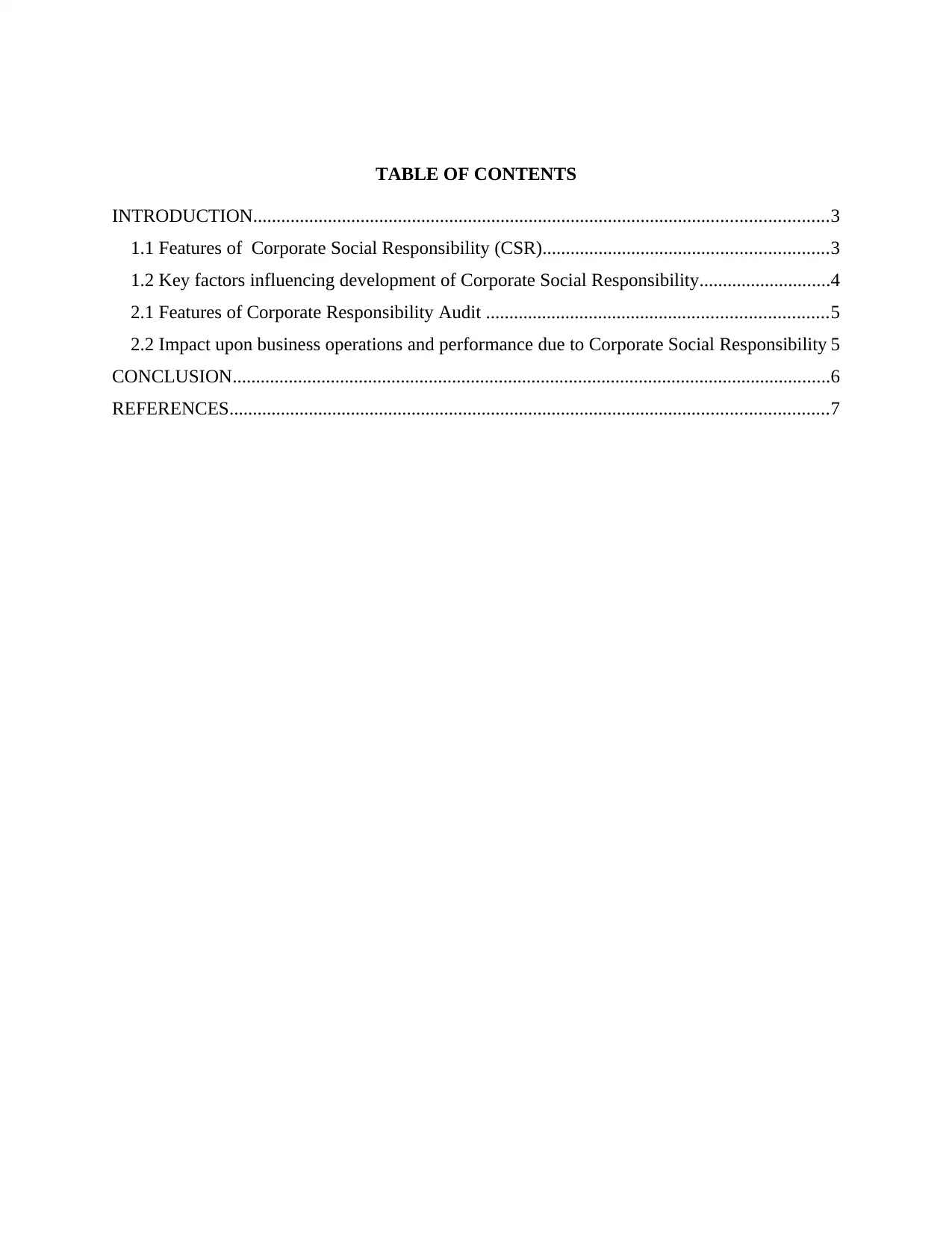
TABLE OF CONTENTS
INTRODUCTION...........................................................................................................................3
1.1 Features of Corporate Social Responsibility (CSR).............................................................3
1.2 Key factors influencing development of Corporate Social Responsibility............................4
2.1 Features of Corporate Responsibility Audit .........................................................................5
2.2 Impact upon business operations and performance due to Corporate Social Responsibility 5
CONCLUSION................................................................................................................................6
REFERENCES................................................................................................................................7
INTRODUCTION...........................................................................................................................3
1.1 Features of Corporate Social Responsibility (CSR).............................................................3
1.2 Key factors influencing development of Corporate Social Responsibility............................4
2.1 Features of Corporate Responsibility Audit .........................................................................5
2.2 Impact upon business operations and performance due to Corporate Social Responsibility 5
CONCLUSION................................................................................................................................6
REFERENCES................................................................................................................................7
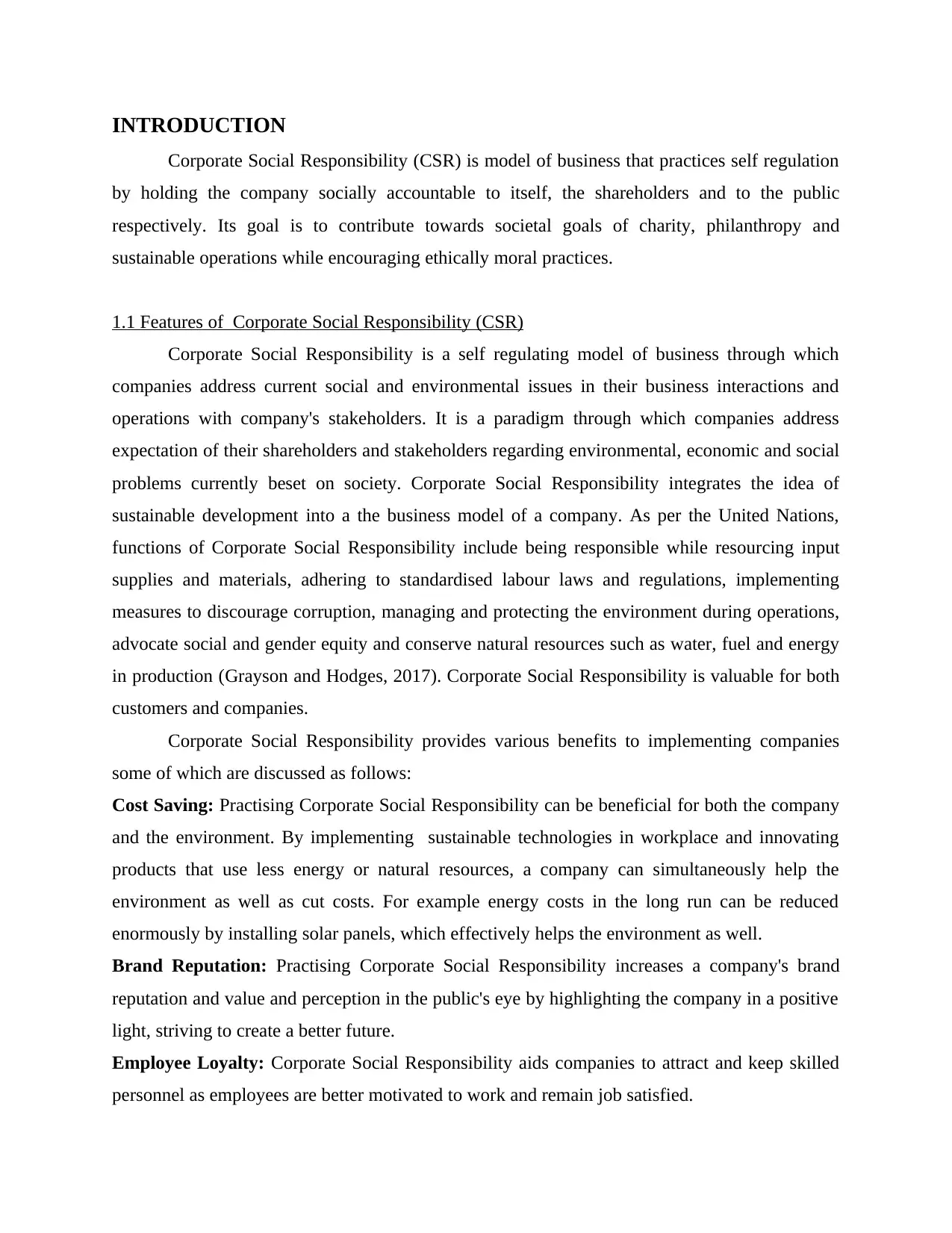
INTRODUCTION
Corporate Social Responsibility (CSR) is model of business that practices self regulation
by holding the company socially accountable to itself, the shareholders and to the public
respectively. Its goal is to contribute towards societal goals of charity, philanthropy and
sustainable operations while encouraging ethically moral practices.
1.1 Features of Corporate Social Responsibility (CSR)
Corporate Social Responsibility is a self regulating model of business through which
companies address current social and environmental issues in their business interactions and
operations with company's stakeholders. It is a paradigm through which companies address
expectation of their shareholders and stakeholders regarding environmental, economic and social
problems currently beset on society. Corporate Social Responsibility integrates the idea of
sustainable development into a the business model of a company. As per the United Nations,
functions of Corporate Social Responsibility include being responsible while resourcing input
supplies and materials, adhering to standardised labour laws and regulations, implementing
measures to discourage corruption, managing and protecting the environment during operations,
advocate social and gender equity and conserve natural resources such as water, fuel and energy
in production (Grayson and Hodges, 2017). Corporate Social Responsibility is valuable for both
customers and companies.
Corporate Social Responsibility provides various benefits to implementing companies
some of which are discussed as follows:
Cost Saving: Practising Corporate Social Responsibility can be beneficial for both the company
and the environment. By implementing sustainable technologies in workplace and innovating
products that use less energy or natural resources, a company can simultaneously help the
environment as well as cut costs. For example energy costs in the long run can be reduced
enormously by installing solar panels, which effectively helps the environment as well.
Brand Reputation: Practising Corporate Social Responsibility increases a company's brand
reputation and value and perception in the public's eye by highlighting the company in a positive
light, striving to create a better future.
Employee Loyalty: Corporate Social Responsibility aids companies to attract and keep skilled
personnel as employees are better motivated to work and remain job satisfied.
Corporate Social Responsibility (CSR) is model of business that practices self regulation
by holding the company socially accountable to itself, the shareholders and to the public
respectively. Its goal is to contribute towards societal goals of charity, philanthropy and
sustainable operations while encouraging ethically moral practices.
1.1 Features of Corporate Social Responsibility (CSR)
Corporate Social Responsibility is a self regulating model of business through which
companies address current social and environmental issues in their business interactions and
operations with company's stakeholders. It is a paradigm through which companies address
expectation of their shareholders and stakeholders regarding environmental, economic and social
problems currently beset on society. Corporate Social Responsibility integrates the idea of
sustainable development into a the business model of a company. As per the United Nations,
functions of Corporate Social Responsibility include being responsible while resourcing input
supplies and materials, adhering to standardised labour laws and regulations, implementing
measures to discourage corruption, managing and protecting the environment during operations,
advocate social and gender equity and conserve natural resources such as water, fuel and energy
in production (Grayson and Hodges, 2017). Corporate Social Responsibility is valuable for both
customers and companies.
Corporate Social Responsibility provides various benefits to implementing companies
some of which are discussed as follows:
Cost Saving: Practising Corporate Social Responsibility can be beneficial for both the company
and the environment. By implementing sustainable technologies in workplace and innovating
products that use less energy or natural resources, a company can simultaneously help the
environment as well as cut costs. For example energy costs in the long run can be reduced
enormously by installing solar panels, which effectively helps the environment as well.
Brand Reputation: Practising Corporate Social Responsibility increases a company's brand
reputation and value and perception in the public's eye by highlighting the company in a positive
light, striving to create a better future.
Employee Loyalty: Corporate Social Responsibility aids companies to attract and keep skilled
personnel as employees are better motivated to work and remain job satisfied.
⊘ This is a preview!⊘
Do you want full access?
Subscribe today to unlock all pages.

Trusted by 1+ million students worldwide
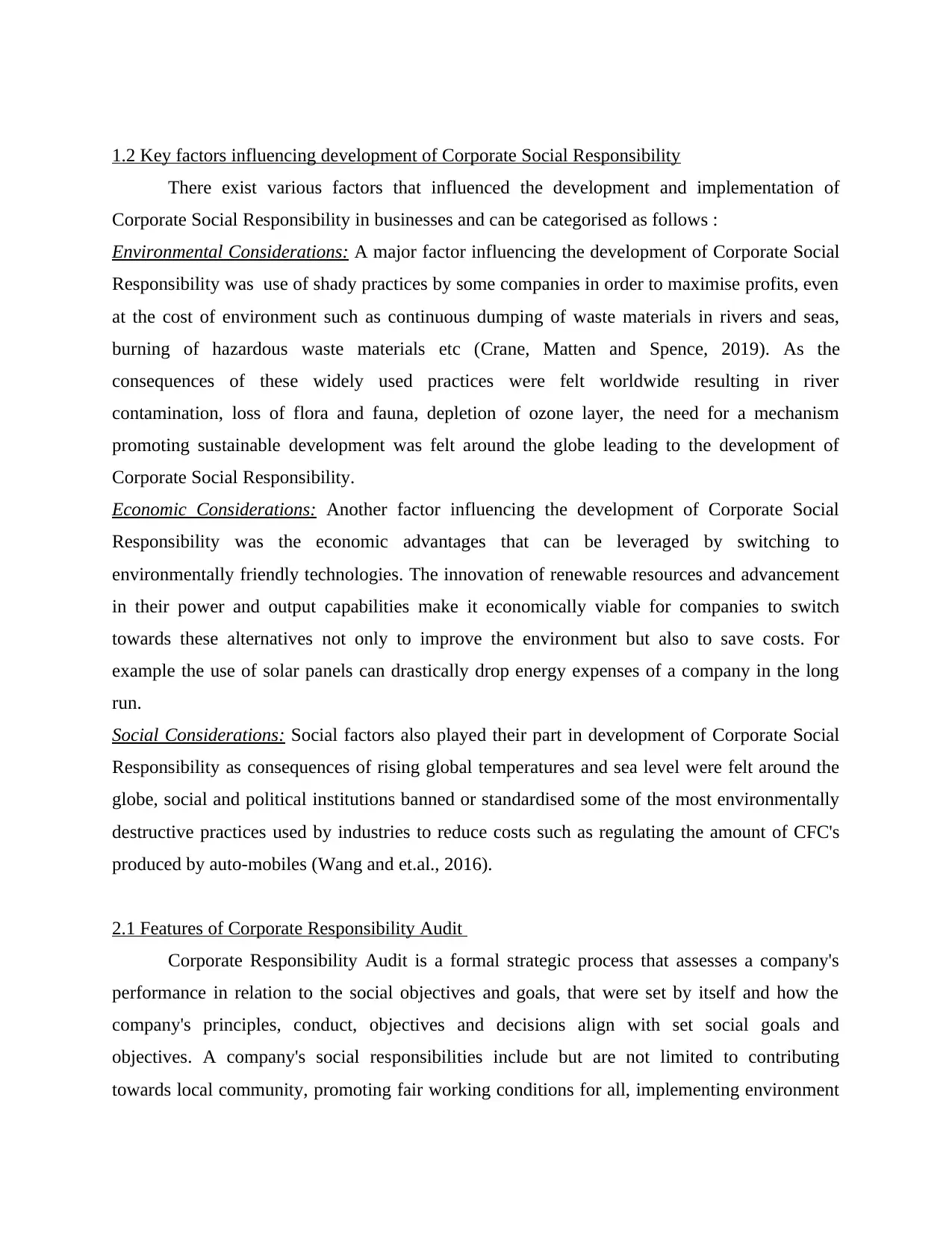
1.2 Key factors influencing development of Corporate Social Responsibility
There exist various factors that influenced the development and implementation of
Corporate Social Responsibility in businesses and can be categorised as follows :
Environmental Considerations: A major factor influencing the development of Corporate Social
Responsibility was use of shady practices by some companies in order to maximise profits, even
at the cost of environment such as continuous dumping of waste materials in rivers and seas,
burning of hazardous waste materials etc (Crane, Matten and Spence, 2019). As the
consequences of these widely used practices were felt worldwide resulting in river
contamination, loss of flora and fauna, depletion of ozone layer, the need for a mechanism
promoting sustainable development was felt around the globe leading to the development of
Corporate Social Responsibility.
Economic Considerations: Another factor influencing the development of Corporate Social
Responsibility was the economic advantages that can be leveraged by switching to
environmentally friendly technologies. The innovation of renewable resources and advancement
in their power and output capabilities make it economically viable for companies to switch
towards these alternatives not only to improve the environment but also to save costs. For
example the use of solar panels can drastically drop energy expenses of a company in the long
run.
Social Considerations: Social factors also played their part in development of Corporate Social
Responsibility as consequences of rising global temperatures and sea level were felt around the
globe, social and political institutions banned or standardised some of the most environmentally
destructive practices used by industries to reduce costs such as regulating the amount of CFC's
produced by auto-mobiles (Wang and et.al., 2016).
2.1 Features of Corporate Responsibility Audit
Corporate Responsibility Audit is a formal strategic process that assesses a company's
performance in relation to the social objectives and goals, that were set by itself and how the
company's principles, conduct, objectives and decisions align with set social goals and
objectives. A company's social responsibilities include but are not limited to contributing
towards local community, promoting fair working conditions for all, implementing environment
There exist various factors that influenced the development and implementation of
Corporate Social Responsibility in businesses and can be categorised as follows :
Environmental Considerations: A major factor influencing the development of Corporate Social
Responsibility was use of shady practices by some companies in order to maximise profits, even
at the cost of environment such as continuous dumping of waste materials in rivers and seas,
burning of hazardous waste materials etc (Crane, Matten and Spence, 2019). As the
consequences of these widely used practices were felt worldwide resulting in river
contamination, loss of flora and fauna, depletion of ozone layer, the need for a mechanism
promoting sustainable development was felt around the globe leading to the development of
Corporate Social Responsibility.
Economic Considerations: Another factor influencing the development of Corporate Social
Responsibility was the economic advantages that can be leveraged by switching to
environmentally friendly technologies. The innovation of renewable resources and advancement
in their power and output capabilities make it economically viable for companies to switch
towards these alternatives not only to improve the environment but also to save costs. For
example the use of solar panels can drastically drop energy expenses of a company in the long
run.
Social Considerations: Social factors also played their part in development of Corporate Social
Responsibility as consequences of rising global temperatures and sea level were felt around the
globe, social and political institutions banned or standardised some of the most environmentally
destructive practices used by industries to reduce costs such as regulating the amount of CFC's
produced by auto-mobiles (Wang and et.al., 2016).
2.1 Features of Corporate Responsibility Audit
Corporate Responsibility Audit is a formal strategic process that assesses a company's
performance in relation to the social objectives and goals, that were set by itself and how the
company's principles, conduct, objectives and decisions align with set social goals and
objectives. A company's social responsibilities include but are not limited to contributing
towards local community, promoting fair working conditions for all, implementing environment
Paraphrase This Document
Need a fresh take? Get an instant paraphrase of this document with our AI Paraphraser
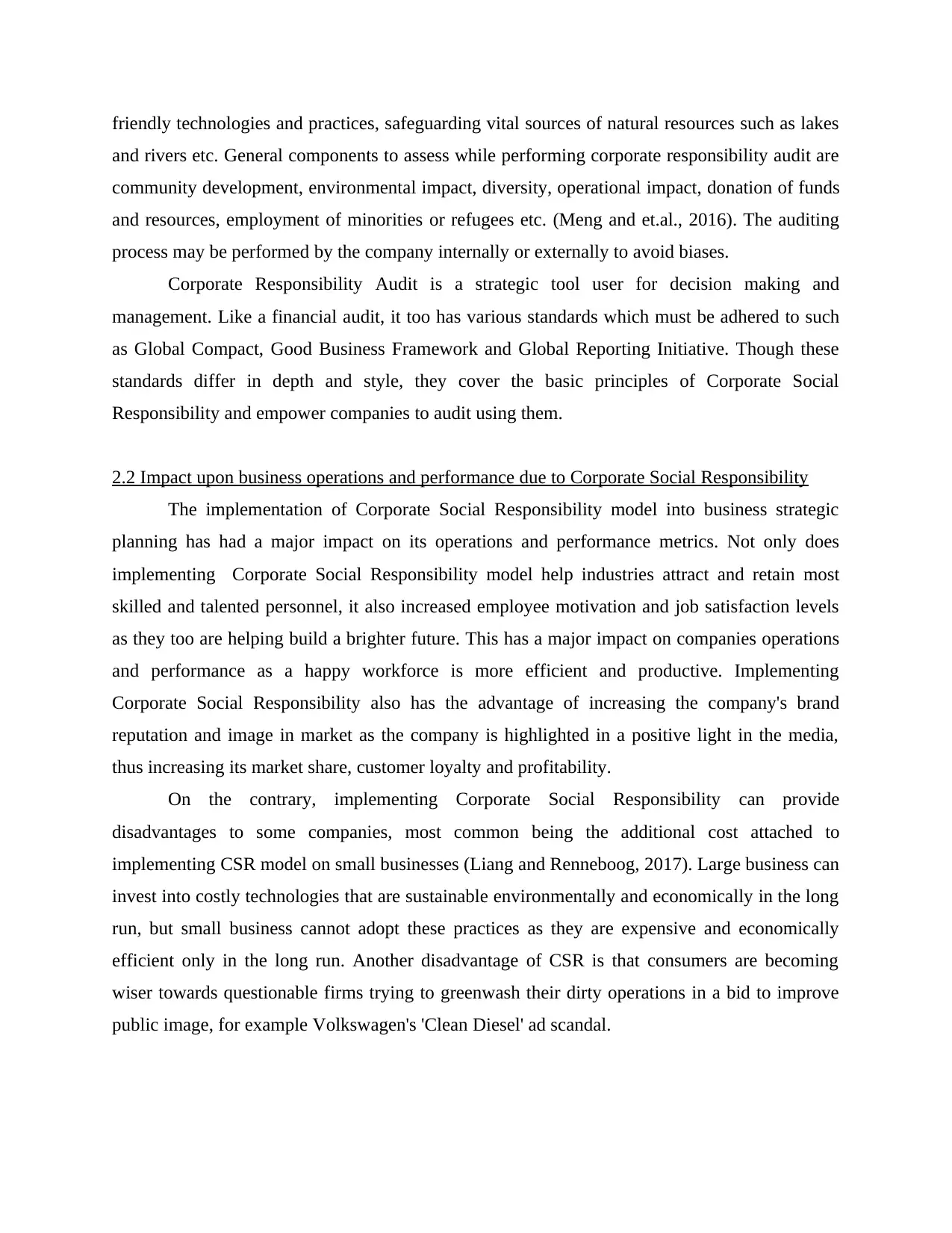
friendly technologies and practices, safeguarding vital sources of natural resources such as lakes
and rivers etc. General components to assess while performing corporate responsibility audit are
community development, environmental impact, diversity, operational impact, donation of funds
and resources, employment of minorities or refugees etc. (Meng and et.al., 2016). The auditing
process may be performed by the company internally or externally to avoid biases.
Corporate Responsibility Audit is a strategic tool user for decision making and
management. Like a financial audit, it too has various standards which must be adhered to such
as Global Compact, Good Business Framework and Global Reporting Initiative. Though these
standards differ in depth and style, they cover the basic principles of Corporate Social
Responsibility and empower companies to audit using them.
2.2 Impact upon business operations and performance due to Corporate Social Responsibility
The implementation of Corporate Social Responsibility model into business strategic
planning has had a major impact on its operations and performance metrics. Not only does
implementing Corporate Social Responsibility model help industries attract and retain most
skilled and talented personnel, it also increased employee motivation and job satisfaction levels
as they too are helping build a brighter future. This has a major impact on companies operations
and performance as a happy workforce is more efficient and productive. Implementing
Corporate Social Responsibility also has the advantage of increasing the company's brand
reputation and image in market as the company is highlighted in a positive light in the media,
thus increasing its market share, customer loyalty and profitability.
On the contrary, implementing Corporate Social Responsibility can provide
disadvantages to some companies, most common being the additional cost attached to
implementing CSR model on small businesses (Liang and Renneboog, 2017). Large business can
invest into costly technologies that are sustainable environmentally and economically in the long
run, but small business cannot adopt these practices as they are expensive and economically
efficient only in the long run. Another disadvantage of CSR is that consumers are becoming
wiser towards questionable firms trying to greenwash their dirty operations in a bid to improve
public image, for example Volkswagen's 'Clean Diesel' ad scandal.
and rivers etc. General components to assess while performing corporate responsibility audit are
community development, environmental impact, diversity, operational impact, donation of funds
and resources, employment of minorities or refugees etc. (Meng and et.al., 2016). The auditing
process may be performed by the company internally or externally to avoid biases.
Corporate Responsibility Audit is a strategic tool user for decision making and
management. Like a financial audit, it too has various standards which must be adhered to such
as Global Compact, Good Business Framework and Global Reporting Initiative. Though these
standards differ in depth and style, they cover the basic principles of Corporate Social
Responsibility and empower companies to audit using them.
2.2 Impact upon business operations and performance due to Corporate Social Responsibility
The implementation of Corporate Social Responsibility model into business strategic
planning has had a major impact on its operations and performance metrics. Not only does
implementing Corporate Social Responsibility model help industries attract and retain most
skilled and talented personnel, it also increased employee motivation and job satisfaction levels
as they too are helping build a brighter future. This has a major impact on companies operations
and performance as a happy workforce is more efficient and productive. Implementing
Corporate Social Responsibility also has the advantage of increasing the company's brand
reputation and image in market as the company is highlighted in a positive light in the media,
thus increasing its market share, customer loyalty and profitability.
On the contrary, implementing Corporate Social Responsibility can provide
disadvantages to some companies, most common being the additional cost attached to
implementing CSR model on small businesses (Liang and Renneboog, 2017). Large business can
invest into costly technologies that are sustainable environmentally and economically in the long
run, but small business cannot adopt these practices as they are expensive and economically
efficient only in the long run. Another disadvantage of CSR is that consumers are becoming
wiser towards questionable firms trying to greenwash their dirty operations in a bid to improve
public image, for example Volkswagen's 'Clean Diesel' ad scandal.

CONCLUSION
This report analyses features of Corporate Social Responsibility, the key factors that
influenced its development, features of Corporate Responsibility Audit and CSR
implementation's impact on business's operations and performance.
This report analyses features of Corporate Social Responsibility, the key factors that
influenced its development, features of Corporate Responsibility Audit and CSR
implementation's impact on business's operations and performance.
⊘ This is a preview!⊘
Do you want full access?
Subscribe today to unlock all pages.

Trusted by 1+ million students worldwide
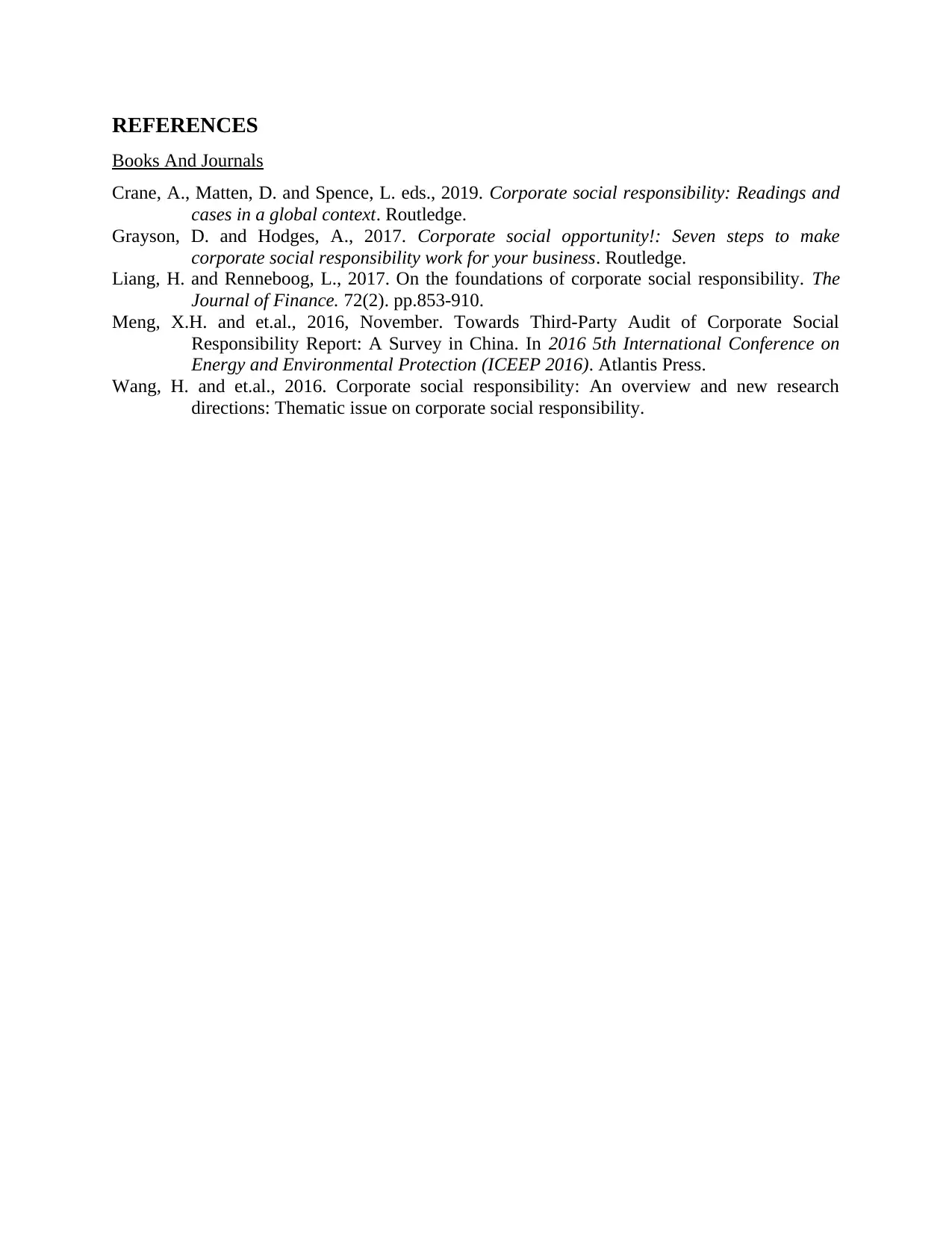
REFERENCES
Books And Journals
Crane, A., Matten, D. and Spence, L. eds., 2019. Corporate social responsibility: Readings and
cases in a global context. Routledge.
Grayson, D. and Hodges, A., 2017. Corporate social opportunity!: Seven steps to make
corporate social responsibility work for your business. Routledge.
Liang, H. and Renneboog, L., 2017. On the foundations of corporate social responsibility. The
Journal of Finance. 72(2). pp.853-910.
Meng, X.H. and et.al., 2016, November. Towards Third-Party Audit of Corporate Social
Responsibility Report: A Survey in China. In 2016 5th International Conference on
Energy and Environmental Protection (ICEEP 2016). Atlantis Press.
Wang, H. and et.al., 2016. Corporate social responsibility: An overview and new research
directions: Thematic issue on corporate social responsibility.
Books And Journals
Crane, A., Matten, D. and Spence, L. eds., 2019. Corporate social responsibility: Readings and
cases in a global context. Routledge.
Grayson, D. and Hodges, A., 2017. Corporate social opportunity!: Seven steps to make
corporate social responsibility work for your business. Routledge.
Liang, H. and Renneboog, L., 2017. On the foundations of corporate social responsibility. The
Journal of Finance. 72(2). pp.853-910.
Meng, X.H. and et.al., 2016, November. Towards Third-Party Audit of Corporate Social
Responsibility Report: A Survey in China. In 2016 5th International Conference on
Energy and Environmental Protection (ICEEP 2016). Atlantis Press.
Wang, H. and et.al., 2016. Corporate social responsibility: An overview and new research
directions: Thematic issue on corporate social responsibility.
1 out of 7
Related Documents
Your All-in-One AI-Powered Toolkit for Academic Success.
+13062052269
info@desklib.com
Available 24*7 on WhatsApp / Email
![[object Object]](/_next/static/media/star-bottom.7253800d.svg)
Unlock your academic potential
Copyright © 2020–2025 A2Z Services. All Rights Reserved. Developed and managed by ZUCOL.




